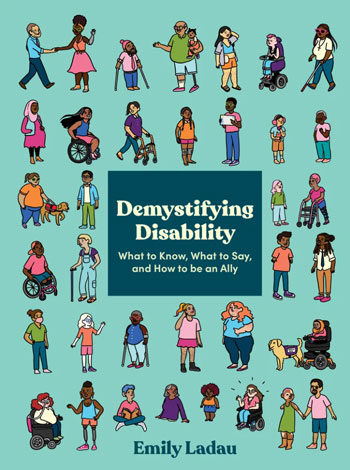Want to Help Create an Inclusive Society? Read the book Demystifying Disability

This text discusses the various kinds of disabilities and how every disabled person experiences their own capabilities uniquely
by Diana Jordan, Assistant Digital Media Editor, Kessler Foundation
Did you know that more than one billion people around the world are disabled? “In fact,” disability rights activist and author Emily Ladau observes, “we’re the largest minority.” She has Larsen syndrome, a disorder that affects the development of bones throughout the body, which is why she uses a wheelchair and has become an authority on disability inclusiveness.
Before I read Emily’s book, Demystifying Disability, I felt I wasn’t educated enough on how to act when speaking to someone with a disability. At times, I was overly cautious and nervous about saying or doing the wrong thing, regardless of whether the disability was physical or invisible, like autism. I may have smiled too much or seemed excessively quiet, which could have suggested that I pitied them. I’ve also noticed other people who talk down to individuals with disabilities or unintentionally treat them like a child. All of these behaviors, and many more, are exactly what Emily describes in her book as how not to conduct yourself around someone with a disability. Realizing this now made me feel embarrassed about my past encounters. However, Emily advises readers that it’s not about feeling shameful, but about breaking those bad habits so you don’t repeat them. She did not write this book to judge people who may have accidentally discriminated against those with disabilities. In fact, Emily herself admits, “There have most definitely been times where I’ve been ableist towards other disabled people.” Ableism is the discrimination or prejudice against people who have disabilities.
Emily’s text clearly illustrates that the purpose of her book is to educate society on the various kinds of disabilities and how every disabled person experiences their own capabilities uniquely. She also provides insight on systemic ableism and how today’s society is very often inaccessible to people with disabilities. For example, a blind man sued Domino’s Pizza in 2019 because the restaurant's app/website was not accessible with screen reader software, so he couldn't place an order. “It’s pretty frustrating that disabled people have to fight so hard for something as basic as being able to order pizza,” Emily writes.
To say I only learned one or two things after reading this book would be an understatement. I learned about concepts that I didn’t know had a name, like ableism, or that people in wheelchairs prefer you to get down to their level when talking to them instead of hovering over them (at least from Emily’s perspective). I also discovered that if we do not change our behavior, ableism will only spread.
Demystifying Disability is an easy-to-read handbook covering a range of topics such as accessibility, etiquette, ableism, disability in the media, and more. Informative, honest, and welcoming, Demystifying Disability is a great starting point to expand your knowledge on disability and should have a place on everyone’s bookshelf to help bring inclusiveness throughout society.
